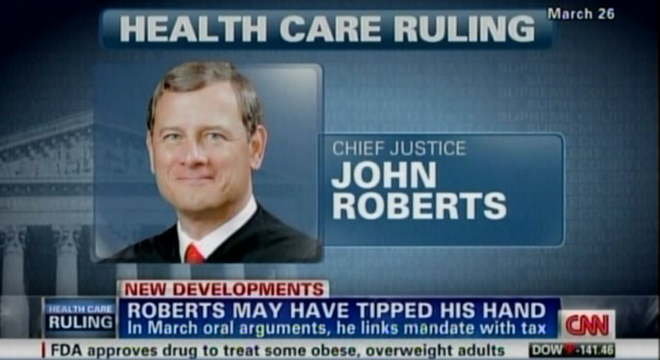John Roberts caught the nation by surprise when his vote saved the Affordable Care Act under Congress’ taxing power. Few expected the chief justice to uphold President Obama’s signature law and even fewer expected him to be the deciding vote in the historic case. Conservatives were furious with what they deemed a betrayal.
After his hostile questioning during oral arguments, most court watchers placed his vote comfortably in the “overturn” column. But in the months leading up to the decision, Roberts left behind a trail of subtle — albeit inconclusive — hints that he may vote in favor of the law.
It began on the first day of oral arguments, when, as TPM reported at the time, Roberts indicated that he believed the enforcement mechanism of the individual mandate makes it indistinguishable from laws derived through Congress authority under the Constitution to levy taxes.
“The idea that the mandate is something separate from whether you want to call it a penalty or tax just doesn’t seem to make much sense,” Roberts told the plaintiffs’ attorney Gregory Katsas. “It’s a command. A mandate is a command. If there is nothing behind the command, it’s sort of, well what happens if you don’t file the mandate? And the answer is nothing. It seems very artificial to separate the punishment from the crime. … Why would you have a requirement that is completely toothless? You know, buy insurance or else. Or else what? Or else nothing.”
On the second day of oral arguments, Roberts tore into the Obama administration’s argument that the individual mandate is valid under the Commerce Clause. He held true to that by declaring otherwise in the decision he ultimately authored. But during the latter half, he swooped in at various points to defend the government’s view in exchanges with the GOP’s star attorney Paul Clement.
“Well, Mr. Clement, the key to the government’s argument to the contrary is that everybody is in this market,” Roberts said. “Everybody is in this market, so that makes it very different than the market for cars or the other hypotheticals that you came up with, and all they’re regulating is how you pay for it.”
Roberts launched into a similar point about the uniqueness of the health care market when Michael Carvin, a lawyer for the plaintiffs, warned that it could permit Congress to force people to enter the mortgage market.
“No, no, that’s not — I don’t think that’s fair, because not everybody is going to enter the mortgage market,” the chief justice said. “The government’s position is that almost everybody is going to enter the health care market.”
Two weeks later, after initial votes had privately been cast by the justices, Roberts in a separate case made an apparent allusion to the court’s legacy and credibility — a consideration that was weighing heavily on him. As TPM reported at the time, he hinted at how he could save the health care law while also circumscribing federal power.
“‘Embarrass the future’?” wrote court watcher Linda Greenhouse in the New York Times back in April, quoting a phrase Roberts used in a brief concurring opinion on a decision involving strip searches of inmates.
“The quote, from a 1944 opinion by Justice Felix Frankfurter in a tax case, is usually offered to mean that the court shouldn’t encumber itself by declaring solutions to problems that have yet to emerge,” Greenhouse continued. “Maybe that’s all the chief justice meant. But John Roberts is both a careful prose stylist and a man acutely conscious of his and the court’s place in history. There are so many other ways of expressing a minimalist impulse than this unconventional use of the word ’embarrass’ that I have to wonder whether he didn’t have in mind the prospect of institutional embarrassment, and not only in the case at hand.”






